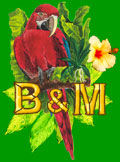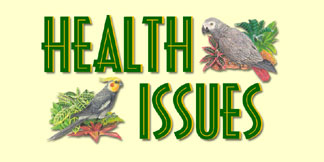

Email
Karen,
The Parrot Lady™
Housing Considerations
Pet birds may be caged or allowed to remain on a perch while the owner is home and can supervise their activity. All birds should be confined to cages while their owners are away to avoid accidental injury and other misfortune. DO NOT keep your bird's cage in the kitchen. Fumes from gas stoves, super heated Teflon non-stick coated pans and smoke from the occasional burnt food can kill your bird. Birds have very delicate respiratory systems and will die within minutes of inhaling these types of deadly fumes.
Make sure the cage that you purchase is an appropriate size for your bird. Ask the shop owner what he or she would recommend. Also, ask the shop owner where you should locate the bird in your home. Supply your pet with lots of toys and shredding materials. Buy only those toys that are specifically designed for birds.
DO NOT let your pet bird be comfortable on the floor. It is very easy to accidentally step on it, thereby severely injuring or killing your bird.
Good Grooming
Good grooming is essential to a happy and healthy pet bird. Be sure to have your bird's wings clipped. The decision to deny a caged bird free, unrestricted flight was unconsciously made by each bird owner at the time the bird was made a captive pet in the home. Wing clipping is merely a procedure that makes this confinement safer for the bird. Besides the safety factor, this procedure often makes birds that would otherwise develop dominant, aggressive personalities more manageable within the home. We prefer that both wings be clipped so that the bird's descent to the floor will be balanced and relatively controlled.
Beak and toenail trimming is extremely important. Since caged birds live in a human engineered environment, there is little if no irregularity in the surfaces with which they come in contact. Therefore, their beaks and claws have a tendency of overgrowing and becoming rough. This can create eating and perching problems in the long run. Most caged birds need their beaks and claws trimmed periodically depending on the species and the time of the season. We DO NOT recommend using sandpaper covered perches. They do not prevent claw overgrowth, but instead cause irritation and excessive wear to the soles of the feet.
WE HIGHLY RECOMMEND THAT YOU HAVE A PROFESSIONALLY TRAINED PERSON PERFORM GROOMING ON YOUR PET BIRD FOR HIS SAFETY AS WELL AS YOURS!
Drafts
Contrary to popular opinion, drafts are not harmful to healthy pet birds. A draft is merely a slight movement of air, usually accompanied by a mild decrease in temperature in the immediate area where it is experienced. Drafts are, therefore, usually inconsequential as far as pet birds are concerned. However, most caged birds are relatively intolerant to the rapid temperature extremes produced by thermostatically controlled air conditioners. We would recommend that cages and perches certainly not be positioned beside or underneath air conditioning, heating, and ventilation outflows. Furthermore, sick birds should be removed from drafty circumstances in order to prevent the additional stress of heat loss to them.
Bathing
Many of our pet birds forefathers came from tropical climates where rainfall is a daily occurrence. (NEVER buy a bird that wasn't bread from DOMESTIC parents) These birds take advantage of the rainfall or the puddles to bathe themselves. Our domestic pet birds need the same luxury of bathing to keep their feathers healthy and to restore and maintain a brilliant sheen to their plumage. You can provide an appropriate size container for your bird to bathe in, or your bird may tolerate letting himself be sprayed with a mister bottle filled with tap water, or perhaps he'll enjoy sharing the shower with you. All of these methods of bathing can be done once daily or as often as your bird will permit. It is important to let your bird air dry in a warm room or in the warm sunshine. Hair dryers can be used to blow dry your bird, but should be held at a safe distance (at least 10 inches) from the bird to prevent burns to the skin.
Covering the Cage at Night
This is a debatable question. Because of the tremendous insulating capacity of feathers, we believe that covering a bird's cage at night is not necessary in order to protect the occupant from a cool and drafty home. The one exception to this would be cold nights in colder climates than we have here in Southern California. Covering your bird's cage does, however, allows your pet to enjoy a regular period of privacy. Furthermore, it tends to keep your bird quiet in the early morning when it would otherwise become active and vocal.
Hygiene
The subject of hygiene of caged birds is an extremely important one. Cages: droppings often accumulate on cage parts, perches, and they also tend to foul food and water cups, resulting in spoilage (bacterial proliferation and overgrowth) and mold growth. We recommend that perches be kept scrupulously clean at all times. Soap, water, and sandpaper may be used to clean perches. Cage bottoms should be changed daily. Cages should be given a thorough scrubbing and cleaning at least once a month.
Food and Water Cups: these should be thoroughly cleaned once or twice daily before they are replenished. We suggest having 2 - 3 sets of water and food dishes that are changed on a daily rotating basis. When not in use they can be soaking in a "bird safe" disinfectant solution. Whenever possible, use a dishwasher to clean water and food containers as the extremely hot temperatures reached by these appliances aid in the disinfecting process.
Water should be changed at least twice a day, if not more frequently. The water may look perfectly harmless to you, but large numbers of bacteria which can be fatal to your bird can grow in a matter of hours from food, saliva or feces. Let the tap water run for a couple of minutes before filling your bird's water dish as there is bacteria in the water lines that seems to be tolerated well by man, but can have devastating consequences for caged birds.
Diet Supplementation
Birds, like people, "are what they eat." Therefore, in order for them to be healthy, they must consume all of the necessary nutrients (protein, carbohydrates, fats, vitamins, minerals, and water) and do so in the proper proportions. No actual studies have been done in this area so some of the commercial diets available in the retail marketplace that state they are "complete" or "balanced" haven't scientifically tested, but are the result of breeding successes of approximations of poultry diets. A number of reputable pet food manufacturers have recently developed and are currently marketing specialized processed foods for caged birds. These foods should be part of your birds diet and are available from pet stores or through bird oriented publications.
Vitamin supplementation for birds is highly recommended. Powdered vitamins should be sprinkled over table foods, fruits and vegetables to which the powder will adhere. The powder does not adhere to the seed and moreover the bird usually discards the shell so it won't get the benefit of the vitamins.
Liquid vitamins and minerals are water soluble and can be used quite effectively. DO NOT distribute this type of product over seeds because of the risk of them becoming rancid. The water containers should be scrubbed out thoroughly and changed 2-3 times daily because liquid vitamins and minerals tend to promote bacterial growth. Vitamin supplements for birds must contain Vitamin D-3 because this is the only D vitamin that can be utilized by birds. You may even provide your bird with a cuttle bone or a mineral block that you purchase from the pet store.
The vitamins and minerals supplements represent an "insurance policy" in case your bird's diet is lacking in one or more types of nutrients. Bottom line, make sure your bird gets a varied diet.
Disease
Most disease in caged birds is either directly or indirectly related to three important factors: poor hygiene, malnutrition and/or stress. All caged bird owners must understand that birds tend to "hide" their symptoms for fear of being thrown out of the flock or possibly even being killed by other birds living in the same group. Consequently, it is important to realize that when you recognize one or more symptoms, your bird may well have been sick for one or perhaps two weeks. You CAN NOT take the wait and see approach if you notice something is not right with your bird. As a general rule of thumb, any caged bird that that appears to be ill to its owner is seriously ill. Make an appointment and get them to a qualified Avian veterinarian promptly.
The following list includes clinical symptoms, easily recognizable by the concerned bird owner, that either alone, or in combination, signify potential illness in you bird:
- Discharge from eye/eyes
- Change in clarity or color of eye/eyes
- Closing of eye/eyes
- Swelling of eye/eyes
- Discharge from nostril/nostrils or vent
- Plugged nostril/nostrils
- Soiling of feathers around nostrils or of the head feathers
- Sneezing
- Inability to adequately manipulate food within the mouth
- Reduction in appetite or complete cessation of eating
- Fluffed feathers
- Inactivity
- Droopy wings
- Decrease in preening activity and maintenance of feathers
- A break in the bird's routine
- Cessation of vocalization
- Change of vocal quality (may be very serious)
- Weight loss
- Equilibrium problems (very serious)
- Inability to perch (bird on bottom of cage)
- Limping or lack of full weight-bearing on one limb
- Swollen foot/feet and or joint/joints
- Change in quality and of quantity of droppings
- Open-mouthed breathing when at rest (very serious)
- Tail pumping (up and down motion of the tail when at rest)
- Visible lumps or masses anywhere on the body
- Bleeding - always an emergency situation (regardless of the origin of the blood)
The above information was provided courtesy of
Avian & Exotic Animal Hospital
![]()
![]()
![]()
Home
| About Karen | About
Us | Animal Rescue | Avian
Hospital | Bird Links | Bird
Rescue
Bird
Societies | Events
| Health
Tips | Health Warnings | News
| Our
Birds |
Ordering
Other
Links | Our Products | Our
Services | Pet Info |
Research
Take Action
A
Taz Production
Copyright
©1999-2025
All Rights Reserved
